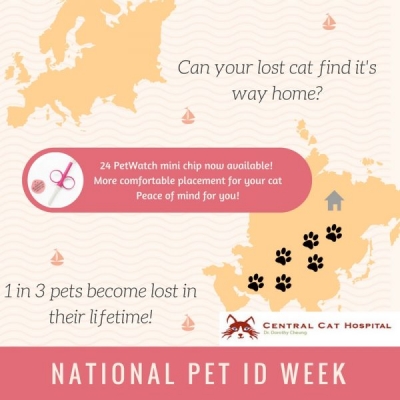- Microchipping improves the chances of reuniting you with your lost cat if your contact information is current. A microchip is a permanent form of identification that your cat can’t lose. The small chip is implanted under the skin in the shoulder area, so if your cat does stray away, the chip reveals the unique ID number assigned to them. So if they turn up at a shelter or clinic, their microchip can be easily tracked to an owner. In the case that your lost pet is injured while missing and requires emergency care, you can be contacted quickly regarding treatment choices.
- ID tags with pet and owner information are another option, if your cat tolerates wearing collars. However, there is a chance that the collar can come off, leaving your cat without ID. Remember to always update your address and phone number when moving with your microchip company, and on your ID tags.
- Check your pet’s rabies tag – you may be able to register it for free online at : http://www.getmehome.com/Pages/About.aspx
- Tattoos on the inner ear flap are an older form of identification. Although semi-permanent (ink can fade over time) there is no universal system for tracking tattooed cats. There is usually a clinic or shelter “Tattoo Log” but this is not a public registry so quick identification can be very difficult. Tattoos can be helpful for describing characteristics of the missing cat in lost and found postings.
- Cat licensing through your municipality is part of being a responsible pet parent. It can also be a valuable tool to link your lost pet back to you. https://www.london.ca/residents/animal-services/ps-pet-protection/Pages/Dog-and-Cat-Licensing.aspx
- Myth: My cat is indoor only and never goes outside so I don’t need a microchip.
Fact: It is actually indoor cats that get lost if they get outside. Outdoor cats are familiar with their surrounding and territory and know their way home. Indoor cats become easily disoriented outside.Resources and tips for re-uniting lost and found pets with their owners
- Contact your microchip registration company. They can put out alerts.
- Check your neighbourhood – lost cats often don’t wander too far from home.
- A local online forum for lost and found pet ads: http://londonlostpets.ca
- Notify your veterinarian if your pet should go missing. Veterinary clinics keep a record of the rabies tag number and if your pet is wearing this tag when found, they can be traced to your veterinarian and then back to you.
- Lost and missing posters with pictures posted in your neighbourhood and around town are helpful!
- Create a lost pet ad in your local newspaper , and / or online.
- Contact Animal Control and local humane societies in your area, visit them daily if possible.
- London Animal Care and Control lost and found pets : https://www.accpets.ca/HowCanWeHelp.aspx


